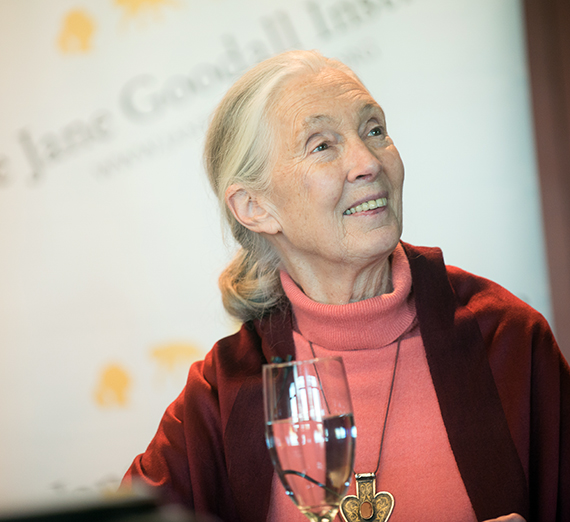Dr. Jane Goodall Wows GU with Tales of Life's Work

By Peter Tormey
SPOKANE, Wash. — World-renowned primatologist and conservationist Dr. Jane Goodall wowed a near-capacity crowd April 9 at Gonzaga University's McCarthey Athletic Center with tales of her life's work doing groundbreaking chimpanzee behavioral research in Africa, and her reasons for hope in the future.
A United Nations Messenger of Peace and the founder of the Jane Goodall Institute, Dr. Goodall was introduced by Gonzaga President Thayne M. McCulloh, who asked her to be part of the Gonzaga Presidential Speaker Series in this, Gonzaga's 125th Anniversary Year.
People from throughout the West and as far away as Hawaii attended. Andrew Takuya Garrett, from Honolulu, surprised his wife with tickets to the event. Afterward, both said they loved every minute of the program.
Called "the Einstein of behavioral sciences" by The Los Angeles Times and "a heroine, in a hero-less time" by The Christian Science Monitor, Dr. Goodall started her speech underscoring the importance of family, and mothers.
"I was blessed in having a very remarkable mother," she said, relating her childhood love of animals and endless fascination with the natural world from the moment she begin to explore nature, crawling to watch earthworms wiggle in the dirt. She spoke of the "enormous treat" of going to a farm in the country as a 5-year-old.
"And it was a treat because this animal-loving little girl lived in London," she said. "But now I had the opportunity to be face-to-face with cows and pigs and horses and there were no cruel intensive farms in those days. The animals walked around in the fields the way they should."
She was given the job of collecting eggs and sought to witness the egg-laying process firsthand.
"Seeing a hen going into her little hen house thinking, 'ah, she's going to lay an egg and crawling in after her, big mistake," Dr. Goodall recalled. "So, with squawks of, I suppose fear, she flew out. . . . So I crawled out and I went into an empty hen house and I hid in the corner at the back, sort of covered in straw, I suppose.
"And I waited.
"And I waited.
"And I waited," she said.
Meantime, her family had no idea where she was and began searching for her as it grew dark outside. Suddenly Jane rushed toward the house covered in straw.
"How many mothers would have seized that child and said, 'How dare you go off without telling us! Do you know how worried we would be? Don't you dare do that again!'"
Instead, Dr. Goodall said, her "wise mother" saw her bright eyes and listened to her story of how a hen lays an egg.
"Now, if we look with hindsight at that story, isn't that the making of a little scientist?" she asked. "The curiosity, asking questions, not getting the right answer. Deciding you have to find out for yourself. Making a mistake, not giving up, and learning patience. It was all there by the time I was five. If I hadn't had that wise mother to support this curiosity, I might not be standing here today."
Goodall also touched on familiar themes supporting her Roots & Shoots, the global environmental and humanitarian youth program that began with a dozen high school students and has grown to include hundreds of thousands of youth in 133 countries who take action to make the world a better place for people, animals and the environment.
An activist, Dr. Goodall travels an average of 300 days a year speaking about the threats facing chimpanzees, other environmental crises, and her reasons for hope that humankind will solve the problems it has imposed on the earth. She has not been in the same place for more than three consecutive weeks in decades.
Roots & Shoots promotes "a philosophy which honors what Gandhi said when he said 'the earth can provide enough for every man's need but not enough for every man's greed,'" Dr. Goodall said. "We're growing young people around the world to understand, yes, we need money to live. But we must not live for money."
In closing, Dr. Goodall offered reasons for hope.
"The energy of youth. The human brain. The resilience of nature. And the indomitable human spirit," she said. "We are moving toward the point of no return if we carry on with business as usual, but all around the world I meet more and more young people who are absolutely determined to make change. And that's the greatest hope of all. And we need to support them. And we all need to jump in ourselves. Because if we just sit back and say, 'Well, it's nothing to do with me,' then we may reach the point of no return, which none of us wants to see, for our great-grandchildren."
